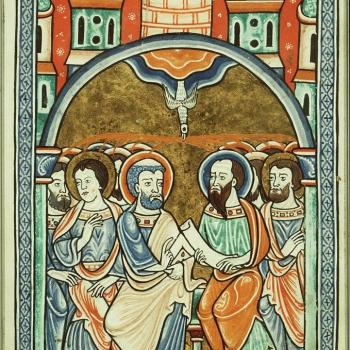 |
| littleny / Shutterstock.com |
I have to admit that I don't pray well. The problem isn't so much of frequency, but of quality. My prayers are pathetic. They call for pity or even scorn because in them I so seldom find myself genuinely before God. Instead I petition him for blessings of various sorts. My prayers too often consist of little more than wish lists, for the most part wishes for others, but also for myself.
Of course petition is part of prayer. The word pray means "to ask," "to entreat," so in prayer one asks for things, one makes a petition before God. Contrary to some, I don't believe that prayers ought not to include petitions for God to meet our needs. Partly I believe that because scripture teaches us to pray for them. Partly I believe it because I've prayed for needs and received quite clear answers to my prayers. I can't imagine not praying for the needs of the refugees from Syria and so many other places of war and deprivation in the world. I can't imagine not praying for my children and grandchildren. And though I sometimes make fun of those who pray for lost keys, I will probably offer a prayer in my heart when I've lost my keys. I'm not sure what the latter kind of prayers mean except that perhaps they recognize my dependence on God in all things, but as a child of God I sometimes offer prayers like a child. They are childish and so am I.
But it is a mistake to think that prayer is merely about asking God for what we need. The Lord's Prayer asks for three things: daily (in other words, sufficient) bread, the forgiveness of sin, and not to be led into temptation (Mt. 6:9-13). The Book of Mormon version of the prayer lists only two; surprisingly, it omits the petition for daily bread (3 Ne. 13:9-13). Whatever we make of that omission, neither version is a Santa-Claus-list of all the things we think would make us happy.
Most of the Lord's Prayer is devoted to devotion and praise: may Thy name be holy; may Thy kingdom come [quickly]; may Thy will be done by us in the same way it is done by the angels; and we pray these because the kingdom and all power and glory belong to Thee forever.
Two things have helped my prayers recently: rereading some things by Jean-Yves Lacoste and rereading Mosiah 4 and Alma 33 from the Book of Mormon. Lacoste reminded me that what is important about being religious is coram Deo, being before God. King Benjamin (whose words are in Mosiah 4) reminds me that if I am to be saved, I must remember God's greatness and my nothingness, and his goodness and long-suffering toward me.
Lacoste has helped me see differently or anew what Zenos preaches about prayer (Alma 33:4-11): prayer is being-before-God; religion is prayer. I cannot be before God without recognizing his power, glory, and wisdom and my own nothingness. But, Zenos reminds us, to be before God is also to ask for the mercy that we know he gives. We should be before God in our houses; in our secret, private places; when, even though we are in the midst of God's congregations and perhaps ought to be made strong by that fellowship, we cry out in need; and when we are before our enemies.
Then, when Alma's companion Amulek rehearses Alma's speech, he understands prayer to be a presence before God in all times and all places. Prayer is not just for the places and times Zenos has mentioned, our private places and congregations. We should also say it over our crops and fields, and presumably over their modern equivalents (Alma 34:17-27). To be a Christian is to be before God in all times and in all places.
Crucially, Amulek adds an additional dimension to being before God:
[I]f ye turn away the needy, and the naked, and visit not the sick and afflicted, and impart of your substance, if ye have, to those who stand in need — I say unto you, if ye do not any of these things, behold, your prayer is vain, and availeth you nothing, and ye are as hypocrites who do deny the faith. (Alma 34:28)
To be before God, I must also be before those in need. As the Lord's Prayer tells us, to ask for mercy we must be giving mercy. My private and public prayers should include prayers for those I know to be needy and naked, in other words without a covering, physical or spiritual, to protect them from the world. My life must be a prayer for them, doing what I realize cannot fully solve the problems that my acts address, but doing what prays for, hopes for, a solution.
Thinking about prayer has reminded me that the more my life is a life of prayer, coram Deo, the more my private prayers will be full and genuine prayers.
12/2/2022 9:09:20 PM





